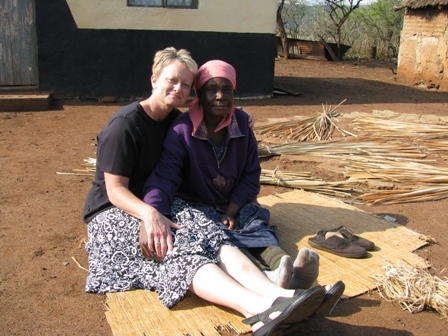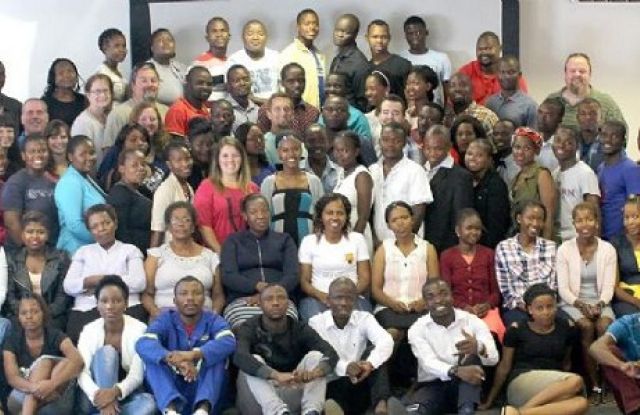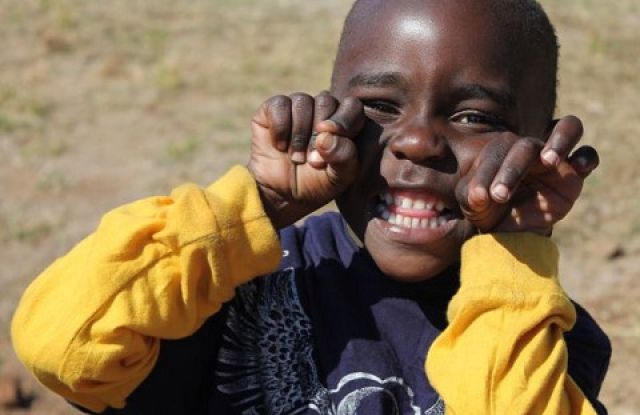The AIDS pandemic – view from ground zero

As detailed in yesterday’s blog, Karen and I just returned from Swaziland. Here’s the story of a visit we made:
Pastor Gift’s wife, Philele, led our little group as we approached the first homestead for a visit. A “homestead” consists of a dirt clearing surrounded by a few dwellings of …
By Seth Barnes
As detailed in yesterday’s blog, Karen and I just returned from Swaziland. Here’s the story of a visit we made:
Pastor Gift’s wife, Philele, led our little group as we approached the first homestead for a visit. A “homestead” consists of a dirt clearing surrounded by a few dwellings of straw, wood, and mud. We walked into the circle of huts. A few small children played in the dirt. Random chickens pecked and crowed. Goats and a skinny dog wandered around.
 The matriarch, a wizened woman of indeterminate age, sat on the ground, her legs outstretched. She had a pile of reeds assembled before her. She would pick up an individual reed and strip away a thin sliver – the first step in weaving a mat like the one she sat on. They call these grandmothers “gogos.”
The matriarch, a wizened woman of indeterminate age, sat on the ground, her legs outstretched. She had a pile of reeds assembled before her. She would pick up an individual reed and strip away a thin sliver – the first step in weaving a mat like the one she sat on. They call these grandmothers “gogos.” As she nodded a welcome, children ran to bring small wooden stools for us to sit on. The children then positioned themselves behind us as we sat in a semi-circle around her.
“I am Gogo Gumbi,” she said, and invited us to sit on wooden stools in front of her.
She pointed to the three children who sat nearby, “These are my grandchildren. Their mother has died and now I raise them.”
Philele translated as we began asking questions. “Who lives here with you?”
“What are you making?”
She answered each query patiently, but briefly, with no explanation.
We asked about her life and how she survives. “It is hard to find food,” she answered, “but it wasn’t always like this. Years ago, everyone had a garden. But the rains stopped coming. Now the sun scorches everything we try to grow.”
With food so scarce and goats so abundant, we asked if they used goats milk. The gogo looked startled and the children erupted in laughter—deep belly laughs. Milk a goat? How absurd! Collecting themselves, the children explained that no, they do not milk goats. But they DO know that goat milk is good for people trying to quit smoking!
She was uncertain about ages of her children and grandchildren. What are years in a cycle of endless days? She remembers that her some of her children were grown when they died. She was not sure of the ages of her grandchildren but thought of them in terms of size and stage of life.
As she answered our questions, her face was impassive, her voice almost a monotone.
Then I asked, “What do you believe about Jesus?”
It was a simple question, but it opened a door. She shared about the pain of losing her husband, siblings, and several of her children to death, but how Jesus carried her through and gave her both comfort and hope. She opened up to share her grief, and as she did, her voice wavered and tears began to fall. Patti responded by going to sit with her on her mat, touching her. There was a bond that transcended physical touch.
Gogo Gumbi indicated with
her chin out the grave sites of her family members buried just behind the huts.
her chin out the grave sites of her family members buried just behind the huts.
“Can we go
there?” I asked. I suggested that we offer a blessing for the memory of her two daughters, so we all walked over. She replied without words, drawing herself upright and walking to
the area marked by stones. There she knelt on the ground in front of the
graves and moaned.
there?” I asked. I suggested that we offer a blessing for the memory of her two daughters, so we all walked over. She replied without words, drawing herself upright and walking to
the area marked by stones. There she knelt on the ground in front of the
graves and moaned.
We prayed. I suggested we sing a song. Patti led, “It is well with my soul.” Philele guided us through the next verse in the Siswati language.
Gogo Gumbi wept, we all prayed and sang, and it was indeed well with our souls.



Praying for Gogo Gumbi and the thousands like her that are grieving yet having to carry on despite the pain for the sake of the children.
Not only do they persevere, but they shine.
Jesus personally walked her through it…she knows what that feels like…I know what that feels like. That is where the bond is. When Jesus personally walks you through something you couldn’t do by yourself…you share something. I think that is as human as it gets. Without realizing your need for Jesus…you don’t possess the ability to relate. It is truly incredible where you find Him…really find Him…amen!!
Wow! Powerful story! Thank you for answering God’s call to go and be with these people at this time. Patti – wait on your blessings girl b/c it’s a-coming! Your faithfulness will be rewarded. God Bless you all!!
Brings back memories. I thought today of writing a book of yours, Andrew’s, and Gary’s teachings. It’d mostly be compiling and editing.
Your Excellency,
Hope you are happy when you receive the letter , I¡¯m the Boris Wang of S&E Bio-technology Development Ltd. (HK).
Our copany are a bio-tech company in research , production and marketing . Now there are ¡°7 Wonder¡± Healthy Nutriment Soup for AIDS and ¡° Sugaria granules”Healthy Nutriment Soup for diabetes mainly .
¡°7 Wonder¡± Healthy Nutriment Soup¡¯s clinical effective ratio is more than 92% , there are 10 of 17 patients of AIDS being healing in clinic ,and the lab index of ¡° viral load¡± of ten of them attained undetactable¡± scope . So the product is the wonderful choice for the patients of AIDS.
¡°Sugaria Granules Healthy Nutriment Soup¡± is prominent effective to diabetes , it can improve various clinical symptoms of diabetes quickly , and it can make the patients give up the dependence on the medicine for diabetes (including ¡°Sugaria Granules Healthy Nutriment Soup¡±) finally .
For further information of our products you can browse our website : http://www.aidqure.com or contact with us ,we will answer your inquiry quickly .
In future health is the greatest wealth of life , the prevention and control to disease are a systematic project as a landmark .Now we are looking for companies being marketing agents all over the world ,and so far there are six companies being a marketing agents in respective countries . We hope sincerely that you will participate in the great project with a lot of opportunities in markets , and please let¡¯s do our best together for human ¡®s health and the harmony of human society !
Best regards,
Boris Wang
S&E Bio-technology Development Ltd.(HK)
Guangzhou Office: No.81 Nonglinxia Road Yuexiu District Guangzhou
Tel:+86 20 87697208
Fax: +86 20 87696790
Mobile: +86 13480226619
E-mail : S.E111@aidqure.com
Website: http://www.aidqure.com